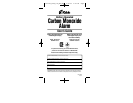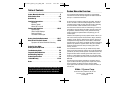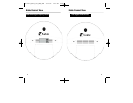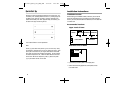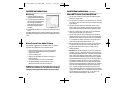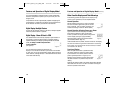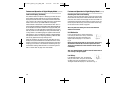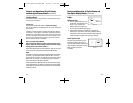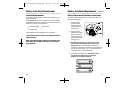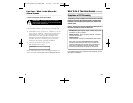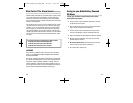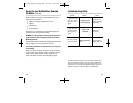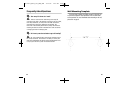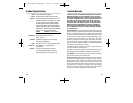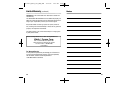
Caring for your Kidde Battery Powered
CO Alarm
To keep your CO alarm in good working order, please
follow these simple steps:
•
Verify unit alarm, lights and battery operation by pushing
the test button once a week.
•
Vacuum the CO alarm cover with a soft brush attachment
once a month to remove accumulated dust.
•
Instruct children never to play with the CO alarm. Warn
children of the dangers of carbon monoxide poisoning.
•
Never use detergents or other solvents to clean the CO alarm .
•
Avoid spraying air fresheners, hair spray, paint or other
aerosols near the CO alarm.
•
Do not paint the CO alarm. Paint will seal the vents and
interfere with the sensor ability to detect CO.
•
Do not place near a diaper pail.
Because carbon monoxide is a cumulative poison, long-term expo-
s u r e s to low levels may cause symptoms, as well as short - t e rm
exposures to high levels. This Kidde unit has a time-weighted
a l a rm - the higher the level of carbon monoxide present, the sooner
the alarm will be triggere d .
This CO alarm can only warn you of the presence of CO. It does
not prevent CO from occurring, nor can it solve an existing CO
problem. If your unit has alarmed and you’ve provided ventila-
tion by leaving your windows and doors open, the CO buildup
may have dissipated by the time help responds. Although your
problem may appear to be temporarily solved, it’s crucial that the
source of the CO is determined and that the appropriate repairs
are made.
What To Do If The Alarm Sounds
( c o n t i n u e d )
This CO alarm meets the alarm response time re q u i rem ents as follows:
At 70 PPM, the unit must alarm within 60-240 minutes
At 150 PPM, the unit must alarm within 10-50 minutes
At 400 PPM, the unit must alarm within 4-15 minutes
WARNING
This product is intended for use in ordinary indoor residential
areas. It is not designed to measure compliance with commerc i a l
and industrial standard s .
This device is designed to protect individuals from acute effects
of of carbon monoxide exposure. It may not fully safeguard indi-
viduals with specific medical conditions. If in doubt, consult a
medical practitioner. Individuals with medical problems may con-
sider using warning devices, which provide audible and visual sig-
nals for carbon monoxide concentrations under 30 ppm
.
20
21
810-2263_RevA_146_MAN_ENG 4/14/04 3:29 PM Page 20



